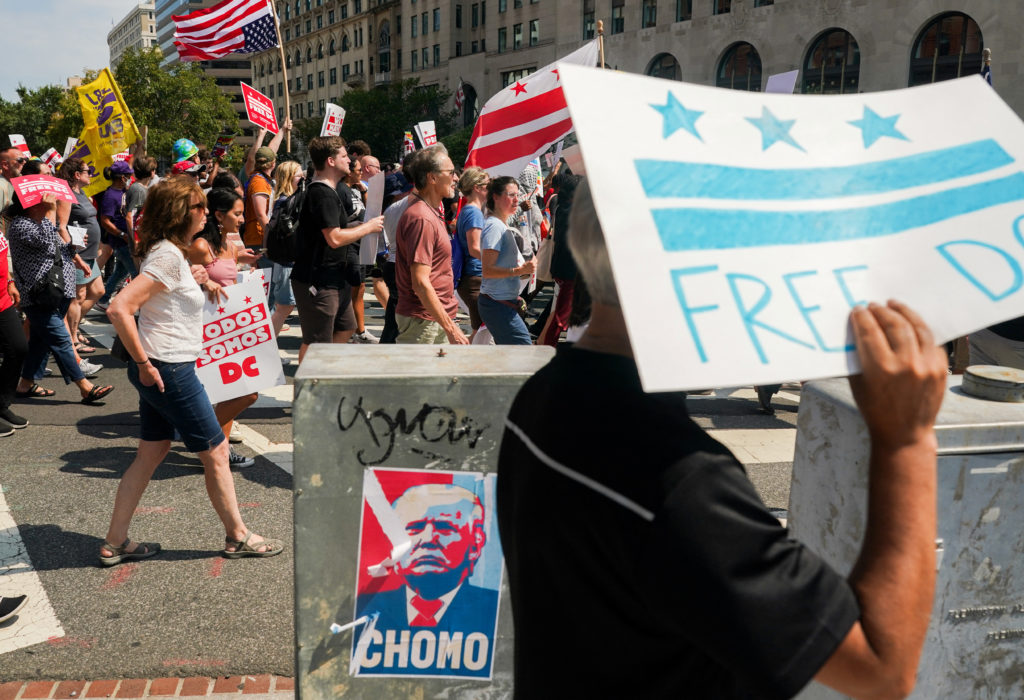President Donald Trump’s temporary control over Washington, D.C.’s police department is set to end next week, as the 30-day limit on his takeover approaches. Mayor Muriel Bowser has promised to continue working closely with federal law enforcement.
Meanwhile, demonstrators are planning a “We Are All D.C.” protest on Saturday to voice their opposition to Trump’s move. The event can be watched live online.
Trump assumed control of the Metropolitan Police Department in August and deployed hundreds of National Guard troops, saying he wanted to “take our capital back” from criminals. He used a section of the District of Columbia Home Rule Act in an executive order, declaring a “crime emergency” that allowed his administration to temporarily manage the police force. That 30-day order is set to expire on September 10.
Any extension of Trump’s temporary control would require Congress’s approval, and Republican leaders on Capitol Hill have indicated they won’t take that step in the coming week.
Still, House Republicans plan to push forward a series of bills aimed at increasing federal oversight of the city. These measures include tougher criminal penalties and initiatives, led by Trump, to “beautify the district” by removing graffiti and restoring public monuments.
Kentucky Rep. James Comer, Republican chairman of the House Committee on Oversight and Government Reform, said the committee will work “together with President Trump” to “fulfill its constitutional duty to oversee District affairs and make D.C. safe again.”

Demonstrators march past an image of President Donald Trump during the “We Are All D.C.” protest against the federal takeover of the city and the deployment of National Guard troops in Washington, D.C., on September 6, 2025. (Photo by Daniel Becerril/Reuters)
Mayor Muriel Bowser has ordered the city to continue operating its emergency operations center, which was set up in response to the recent surge in federal law enforcement in Washington, D.C. Bowser praised the collaboration between local police and federal agencies, saying the surge has helped reduce crime—most notably an 87 percent drop in carjackings.
Despite the presence of federal authorities, Republican leaders in Congress have signaled they don’t plan to intervene. According to aides speaking anonymously, Bowser’s cooperation with federal agencies and Trump’s lack of any public call for an extension have removed the impetus for action.
Democrats, however, have strongly objected to the temporary federal takeover. Del. Eleanor Holmes Norton, the city’s nonvoting representative, is pushing legislation to return full control of the police department to the city. Maryland Senator Chris Van Hollen introduced a similar bill in the Senate, warning that Trump is “playing dictator in our nation’s capital.”
Bowser has not specified how long the city will continue working with federal authorities. She emphasized that crime reductions—especially the decline in carjackings—have made neighborhoods feel safer. Yet she also acknowledged that the presence of masked, unidentified federal agents has strained trust between the police and local communities.
The city has legally challenged Trump’s use of the National Guard, arguing that deploying armed troops for domestic law enforcement is unlawful. District Attorney General Brian Schwalb filed a lawsuit, while local residents have protested, sharing videos of arrests and detainments on social media.
Trump and Republican officials, by contrast, have framed the takeover as a success. Last week, Trump declared that the city was safe and thriving, claiming restaurants were booming and asserting, “We have no crime. You’re not going to be shot.”
Around 1,340 National Guard troops, including those sent from Republican-led states, are expected to remain in Washington through the end of the year. How long they stay will ultimately depend on the decisions of their respective governors, according to PBS.

